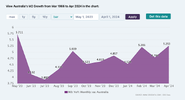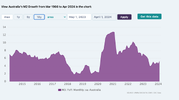over9k
So I didn't tell my wife, but I...
- Joined
- 12 June 2020
- Posts
- 5,291
- Reactions
- 7,510
UK gets back to 2%, but will have to hold quite a bit below 2% for quite some time to get back on long term trend.
Universities became greedy corporations. The level of education they provided has basically created a sea of idiots."https://www.forbes.com/sites/jasonw...ewer-college-grads-so-why-bother-with-school/"
"The skills-based hiring movement is here"
A very diplomatic way to say that companies just aren't valuing degrees all that much any more.
Yet, fees continue to increase (inflate).
Producing people with minor degrees that aren't worth that much, except for the recipient to say I have XYZ after my name.Universities became greedy corporations. The level of education they provided has basically created a sea of idiots.
Add to that the interest bill on the HECS account, thus the projectile line.View attachment 179181
What's so comical is that the fees haven't increased (inflated) that much here in aus, which makes it more of a salary (or lack thereof) problem.
Combine this with your bills inflating and this makes the debt all but impossible to pay off.




best of luck on the term deposit rates , they normally drag behind like a puppy on it's first walk on a leashWill be good for term deposits

 www.comparethemarket.com.au
www.comparethemarket.com.au
More than 100,000 litres of sewage are being trucked daily from northern Adelaide suburbs not connected to mains because of SA Water connection failures. Housing Minister Nick Champion warned Adelaide was running out of trucks to cart the effluent – an average of at least ten vacuum trucks per day has been required.
Govt to boost concession payments to dilute water bill rise pain
The state government will offer $64 million in concessions to help households on lower incomes cope with an $85 average annual rise in their water bills.
An average concession card holder will receive $412 off their annual water and sewer bill under the new scheme, Premier Peter Malinauskas announced today, after yesterday revealing that water bills would be going up 3.5 per cent above inflation next financial year.
Previous concessions payments for water bills ranged from $146.30 and $359.70 a year.
The new concessions will be distributed to more than 190,000 concession recipients and applied directly to their water and sewer bills rather than a cash payment, according to the state government.
The move means an average metropolitan household using 189kL of water per year with a property value of $706,000 will only incur a bill hike of $8 a quarter if they receive the concession, rather than the $21 increase flagged on Tuesday.
A breakdown of SA Water bill increases (pre-concession payment). Table: SA Govt
“We want to ameliorate the impact for those who feel it most in our community, particularly pensioners,” Malinauskas said, adding that the “vast bulk” who would receive the payment would be pensioners.
Asked if the concessions would be increased each year to reflect yearly increases in water bills, Malinauskas said the government would “assess that on a year-by-year basis”.
The $64.8 million package is “in addition” to the $266.2 million cost of living package revealed in the state budget earlier this month, according to the government.
Malinauskas on Tuesday argued the hikes to annual water bills – which will increase around $85 year on year if inflation remains steady – are necessary to fund a $1.5 billion investment in SA Water.
well most of the Governments elected in my area ( Federal , State and Local ) can't be trusted to apply any decent policy ( that usually excludes any tax/rate policy changes ) in their elected term , so of course they run a real risk of being ousted next electionGovernments are only looking on a four year time horizon with the sole goal to get re-elected, no government is looking at the 15-20 year time horizon.
Leading to inflationary and high deficit policy, need to look no further then Queensland to see a prime example, of using short term high deficit policy as an attempt to win the next election. Or the subsidies in the federal budget, which are the opposite of deflationary.
No current government neither liberal/labour is willing to make hard decisions for the long term prosperity of this country due to the risk of losing in the next election.
In my view things like the Housing Commission were imperfect but overall we were far better off with them than without them.Here is how poor quality government MPs cause issues with inflation and economics.
They change rules on things set up by previous governments that are working, like the SA housing commission that helped people on low income to either rent a home or buy one.

I guess it's a case of perceived flaws with productivity, Vs loss in output due to private sector profit margins.They built a lot of houses, they put a roof over the heads of low income people, and they trained a lot of trades apprentices whilst doing so. In my view that more than makes up for any perceived flaws with productivity and so on, they did at least get the job done and reasonably economically too.
Hello and welcome to Aussie Stock Forums!
To gain full access you must register. Registration is free and takes only a few seconds to complete.
Already a member? Log in here.